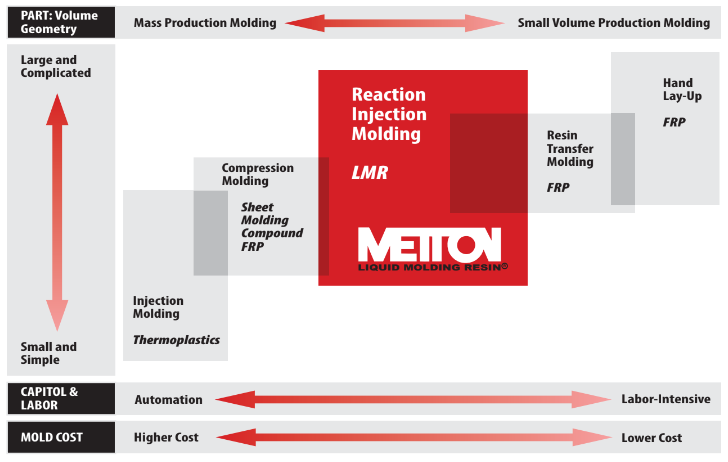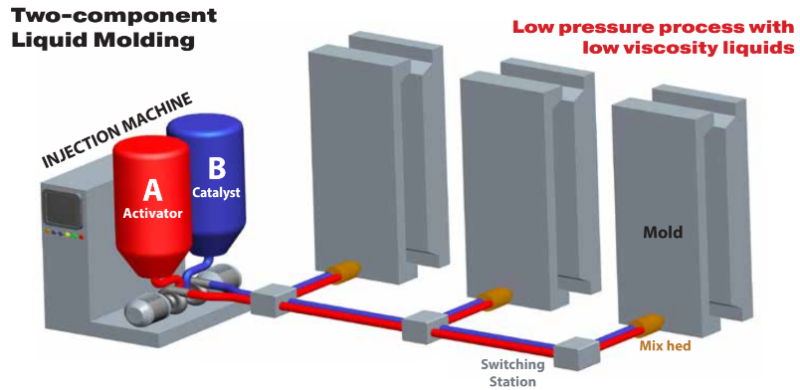Knowde Enhanced TDS
Identification & Functionality
- Chemical Family
- Polymer Name
- Plastics & Elastomers Functions
- Technologies
- Product Families
Features & Benefits
- Materials Features
- Performance Benefits
- Excellent damage tolerance
- Large and light weight
- Chemical resistance
- Dimensional stability
- Electrical insulating properties
- Outstanding surface finish
- Design and Processing Benefits
- Low pressure pr°Cessing
- Design freedom
- Large & complex part capability
- No mold releasing agent
- Short cycle time
- Low capital investment
- No fiberglass
- Multiple Molds per Machine
Applications & Uses
- Applications
- Plastics & Elastomers Processing Methods
Properties
- Flame Rating
- Mechanical Properties
- Electrical Properties
- Note
2 - 0.215 inch plaques molded at cavity and core temperatures of 87°C and 57°C respectively.
3 - Aged samples are used for the Tensile Elongation at Yield, and Notched Izod Impact tests.
4 - HDT will vary with part thickness and mold temperatures.* Ignition may occur within 120 seconds
** Sometimes ignition may not occur in 120 seconds
| Value | Units | Test Method / Conditions | |
| Density₁ | 1.026 - 1.034 | g/cc | ASTM D792 |
| Tensile Strength at yield₁ | 41.7 - 46.9 | MPa | ASTM D638 |
| Tensile Modulus₁ | 1,627 - 1,931 | MPa | ASTM D638 |
| Tensile Elongation at Yield₂,₃ | 4.1 - 5.3 | % | ASTM D638 |
| Flexural Strength at 5% strain₁ | 62.7 - 72.1 | MPa | ASTM D790 |
| Flexural Modulus₁ | 1,765 - 1,985 | MPa | ASTM D790 |
| Notched Izod Impact at 23ºC₂,₃ | 266.4 - 443.6 | J/m | ASTM D256 |
| Rockwell Hardness₁ | R112 - 116 | — | ASTM D785 |
| Compression Strength₁ | 56.6 - 62.2 | MPa | ASTM D695 |
| Shear Strength₁ | 44.8 - 61.6 | MPa | ASTM D732 |
| Deflection Temperature Under Load (at 264 psi)₁,₂ | 118 - 108 | ºC | ASTM D648 |
| Co-efficient of Thermal Expansion (at 0º- 50ºC)₁ | 85.46 - 90.14x10^-6 | m/m/ºC | E831 |
| Shrinkage₂ | 0.7 - 1.0 | % | — |
| Dielectric Constant (freshly molded) (60 Hz at 73º F)₁ | 2.61 - 2.71 | — | ASTM D150 |
| Dissipation Factor (freshly molded) (60 Hz at 73º F)₁ | 0.00056 - 0.00066 | — | ASTM D150 |
| Water Absorption (RT, 24 hrs, freshly molded parts)₁ | 0.12 | % | ASTM D570 |
| Flammability Rating₁ | HB | — | UL |
| Value | Units | Test Method / Conditions | |
| Surface Resistivity | 2.7 x 10^12 | ohm | K6911 |
| Volume Resistivity | 2.4 x 10^16 | ohm-cm | K6911 |
| Dielectric Breakdown | 18.9 | KV/mm | D149 K6911 |
| Dielectric Constant (at 60 Hz) | 2.66 | — | D150 K6911 |
| Dielectric Constant (at 1KHz) | 2.66 | — | D150 K6911 |
| Dielectric Constant (at 1MHz) | 2.65 | — | D150 K6911 |
| Dielectric Loss Tangent (at 60 Hz) | 0.00061 | — | D150 K6911 |
| Dielectric Loss Tangent (at 1 KHz) | 0.00045 | — | D150 K6911 |
| Dielectric Loss Tangent (at 1 MHz) | 0.00087 | — | D150 K6911 |
| Arc Resistance | 73.0 | sec | K6911 |
| Tracking Resistance | max. 600 | CT 1 | IEC112 |
| Hot-Wire Ignition* | min. 120 | sec | UL 746A |
| High Current Arc Ignition | 21.0 | Count | UL 746A |
Regulatory & Compliance
Technical Details & Test Data
- Process/Material Comparisons

- Reaction Injection Molding

- Inject multiple molds with 1 injection machine (typically 5)
- Viscosity similar to motor oil @ 300 centipoise
- Inject parts up to 13 m2 (140ft2) or > 100 kg (220 lbs)
- Cavity pressure of 15 to 30 psi (design mold to maximum 50 psi)
Packaging & Availability
- Packaging Type

